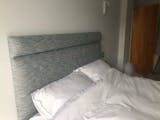We are all aware of the importance of replacing our mattresses at regular intervals - and for a number of reasons. Over time, any mattress - no matter the quality - will lose some of the comfort and support that it's designed to provide, which is why the Sleep Council and the mattress industry alike recommend that mattresses are replaced around every seven years.
However, it's not just the age of a mattress that can affect your sleep and your comfort. If you have a soft mattress, it could be the cause of your back pain.
A quick guide to mattress firmness levels
When shopping for a new mattress, you'll generally find four different levels of firmness to choose from:
- Soft: The lowest amount of support, designed for side sleepers and those who experience hip or shoulder pain with firmer mattresses.
- Medium-soft: Provides some degree of pressure point relief, and more support than a soft mattress.
- Medium-firm: More of a balance of comfort and support, good for those who sleep in a variety of positions. - Firm: The highest level of support, but may not be as comfortable for side sleepers.
The other option is to go for a bespoke mattress, which can be tailor-made to suit the level of firmness that you need, as well as the depth, width and length that you require.
The pros and cons of a soft mattress
There are many benefits to buying a soft mattress. They can help individuals - especially those who are ageing - to deal with joint pain and other issues. They can be a good choice for lighter and slimmer individuals as a greater level of firmness isn't required, and for those who sleep on their side or in the foetal position, a soft mattress can provide the cushioning that is needed to avoid pain in the hips or the shoulders.
However, soft mattresses are not as supportive for those who weigh more, and you may also find that they lose their support more quickly than a firmer model. What's more, when buying a mattress for a bed shared by two people, you may find that a soft mattress works for one but not the other, causing sleep disruption and back and joint pain.

Product: Cosmopolitan Pocket Mattress
Signs that a soft mattress could be causing back pain
If you suffer from back pain, here are some signs that an overly soft mattress could be to blame:
1. Your mattress is over eight years old. No matter how firm your mattress was when you bought it, the support it provides and its level of comfort will naturally deteriorate over time. If you have had your current mattress for eight years or more, it may be time to look into buying a new mattress to give your back the support it needs.
2. You find yourself tossing and turning in your sleep. Do you tend to sleep soundly, with little movement, or are you someone who moves about a lot during the night? If you find yourself tossing and turning, it could well be that you are struggling to find a comfortable sleeping position that is supportive enough for your joints. Not only does this mean that your spine won't be neutrally aligned, which could lead to back pain, it also means that your sleep quality will affect how you feel mentally, as well as physically.
3. You wake up with back pain in the mornings. A telltale sign that a soft mattress is causing back pain is when you go to bed feeling absolutely fine, but wake up in the morning with pain. If your mattress is too soft, your spine won't get the support you need at night, which can cause misalignment and that niggling pain that you've come to associate with your mornings. While back pain can have many causes, its regular presence in the mornings can suggest that a too-soft mattress is to blame.
4. You feel as though you're sinking into your mattress. To a certain extent, it can be comforting to sink back into your bed when you get in, feeling cocooned, cosy and safe. Indeed, many quality mattresses offer comfort and transitional layers at the top, which mould to your body's contours to provide additional comfort. However, if you feel your body sinks down too much, your mattress is likely to be either too soft, or too old.
5. There is a visible dent in your mattress when you wake. Take a look at your mattress when you get out of bed - does it spring back to position, or does your body leave a visible dent in the material? If it's the latter, this would suggest that your spine and other joints aren't getting the support that they need and that it is time to buy a firmer mattress.
How to choose a mattress to avoid back pain
Studies have shown that those who suffer from long-term back pain experience a lower level of pain when sleeping on a medium-firm mattress than when sleeping on a soft or firm mattress, showing that the level of support a mattress provides is vital when looking to take better care of your back. If you tend to sleep on your back, you'll need a mattress that provides a good level of support as well, of course, as comfort.
Choose a mattress made from materials that are firm and supportive and that offer equal distribution of pressure to ensure both support and a comfortable night's sleep. Avoid mattresses that are too soft for your needs, and double-check exactly what you're buying. You'll often find that many top-end mattresses include a pillow top layer - if this layer is too thick, it will affect the level of support that your mattress actually provides.
Finally, make sure your bed frame itself provides a suitable foundation for the mattress of your choice. If your bed frame has slats that are more than eight inches apart, for example, it may not provide adequate support for your mattress, affecting its performance. Here at Endurance Beds, we specialise in solid, UK-made bed frames that provide the perfect foundation for your mattress, complete with a 12-year guarantee. What's more, we can offer a bespoke, made-to-measure bed frame service, allowing you to create not only the right foundation for your perfect mattress, but also to create the right upholstered, wooden or metal design to suit your space.
If you're looking for a new mattress or bed frame to relieve your back pain, have a browse of the Endurance Beds range, or contact us to find out how we can help.







